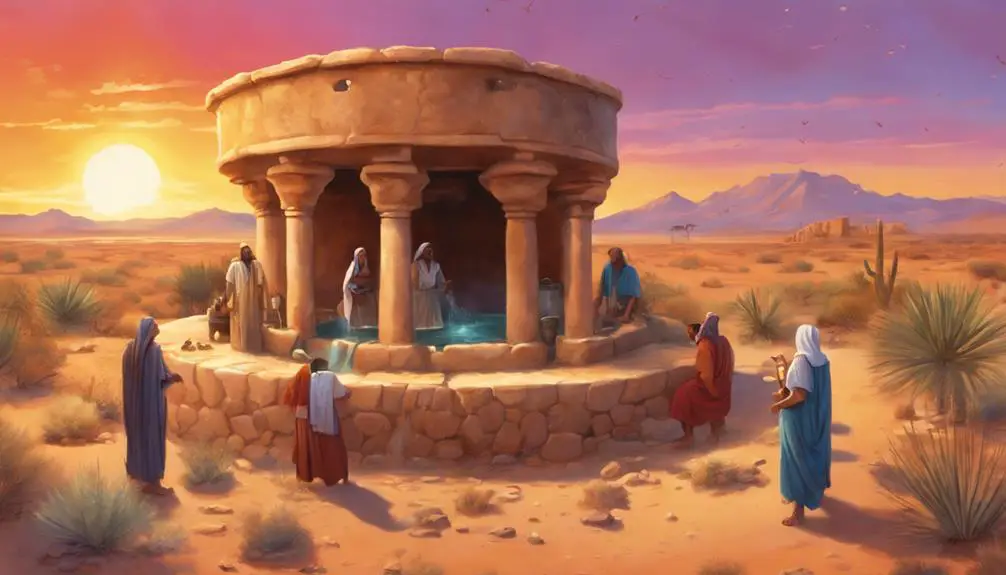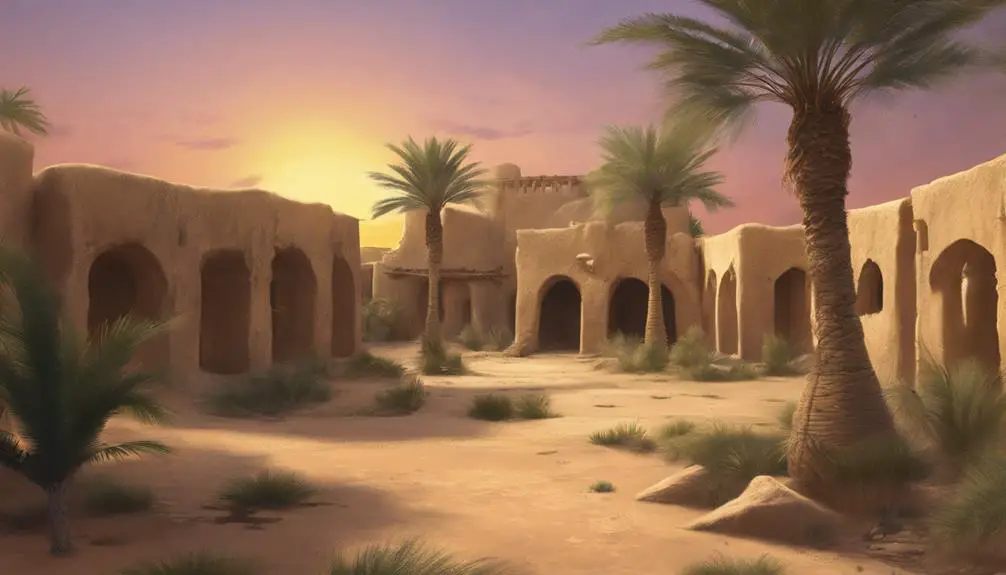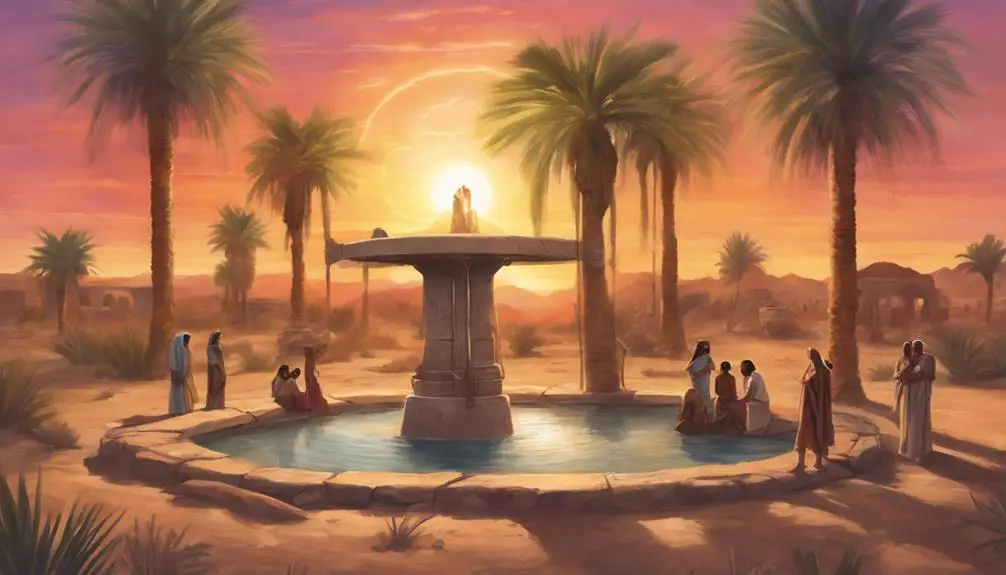Explore the layers of Rehoboth in the Bible, uncovering its deep symbolism of freedom and expansion that resonates through time.

Rehoboth in the Bible Means
Exploring the meaning of Rehoboth in the Bible is like peeling an onion; each layer reveals something more beneath.
You'll find that its origins and mentions, particularly in Genesis, are rich with symbolism and meaning.
Rehoboth symbolizes a place of enlargement and freedom after a period of conflict and hardship. This notion not only offers profound lessons from a historical and spiritual perspective but also holds relevance in today's world.
If you're curious about how an ancient name carries timeless wisdom and its implications for modern life, this journey through its layers promises to uncover intriguing insights.
Key Takeaways
- Rehoboth signifies spaciousness, peace, and the resolution of conflicts.
- It embodies divine provision and reconciliation after adversity.
- Symbolizes freedom, expansion, and spiritual growth through faith.
- Encourages seeking peaceful resolutions for personal and societal advancement.
Origins of Rehoboth

The term 'Rehoboth' finds its origins in the biblical narrative, specifically within the Book of Genesis, where it's mentioned as a location named by Isaac after a dispute over water rights was resolved, symbolizing a place of spaciousness and peace. This etymology exploration reveals not just a literal interpretation but also a profound metaphorical significance. The name itself, derived from the Hebrew word for 'broad places' or 'streets,' suggests not only a physical expanse but also a broader, spiritual concept of freedom and resolution following conflict.
The geographic significance of Rehoboth within the biblical context can't be understated. While its exact historical location remains a topic of scholarly debate, its symbolic value is clear. It represents a turning point, a place where strife ended and reconciliation began. This not only adds layers to our understanding of biblical narratives but also offers insights into the socio-cultural dynamics of the time. By examining Rehoboth's origins, you're delving into a rich tapestry of historical, geographical, and spiritual threads that transcend a mere place on a map, reflecting broader themes of conflict resolution and the pursuit of peace.
Rehoboth in Genesis

In Genesis, Rehoboth emerges as a pivotal location where Isaac's perseverance in the face of adversity leads to the discovery of a well of fresh water, symbolizing divine provision and the end of strife. This narrative unfolds amidst a series of conflicts over water rights, a vital resource in the arid environment where Isaac and his entourage reside. Isaac's diggings in the region previously resulted in disputes with local herdsmen, reflecting the intense competition for water.
The journey to Rehoboth is marked by repeated efforts to secure water sources, each attempt met with opposition from local communities. These confrontations underscore the broader themes of conflict and resolution that permeate Isaac's story. It's only upon reaching Rehoboth that Isaac finally finds a well that prompts no quarrel, signaling a pivotal moment of peace and reconciliation.
This episode is a testament to the importance of persistence in the face of adversity and the potential for conflict resolution through continued effort and faith. The discovery of the well at Rehoboth not only provides a crucial resource for Isaac and his people but also marks a significant turning point in their journey, embodying the resolution of conflict and the establishment of peace.
Symbolism and Meaning

Delving into the symbolism of Rehoboth, one discovers it represents not just a physical location but also a profound emblem of peace, resolution, and divine providence within the narrative. Its mention in the Bible transcends mere geographical significance, embodying a broader message of hope and liberation from conflict. The term Rehoboth itself, meaning 'broad places' or 'spaces', conveys a sense of freedom and expansion after a period of strife and constraint, offering a vivid illustration of overcoming adversity through faith and perseverance.
Cultural interpretations of Rehoboth further enrich its symbolism, highlighting its role as a metaphor for spiritual and personal growth. In various traditions, Rehoboth is seen as a point of transition, a place where one can move beyond past difficulties towards a future filled with possibilities. This perspective emphasizes the importance of reconciliation and forward movement, underscoring the belief in a providential plan that guides individuals through their trials to places of greater peace and prosperity.
Thus, the significance of Rehoboth extends far beyond its literal mention, serving as a powerful symbol of the journey towards peace, resolution, and divine guidance.
Lessons From Rehoboth

Reflecting on Rehoboth offers profound lessons about embracing change and seeking peace amidst life's challenges. The narrative surrounding this biblical location underscores key principles that can guide you in navigating your own life's difficulties.
Here are four pivotal lessons gleaned from Rehoboth:
- Embrace Change: The journey to Rehoboth was marked by continuous movement and adaptation. You're reminded that change isn't just inevitable; it's necessary for growth and finding new opportunities for peace.
- Seek Peaceful Resolutions: The resolution to conflict over water wells teaches the importance of avoiding strife. Opting for conflict resolution can lead to the discovery of your own 'Rehoboth,' a place where you can thrive without tension.
- Value Spiritual Growth: Rehoboth symbolizes a place where one can grow spiritually. It's an invitation to deepen your spiritual journey, recognizing that true peace and contentment come from within.
- Learn from Adversity: Finally, Rehoboth teaches that adversities aren't just obstacles but opportunities. They're chances to learn, to grow, and to move closer to finding your own space of peace and prosperity.
These lessons from Rehoboth, focusing on conflict resolution and spiritual growth, are timeless, offering a blueprint for navigating life's challenges with grace and resilience.
Rehoboth's Modern Relevance

Building on these timeless lessons from Rehoboth, it's crucial to explore how its narrative holds significant relevance in today's rapidly changing world. In the context of urban development, Rehoboth's story offers a rich metaphor for the expansion and evolution of modern cities. It reflects the continuous quest for space where communities can flourish, underscoring the importance of finding solutions to conflicts over resources and land. This biblical account parallels current challenges in urban planning, where the need for peaceful coexistence and sustainability is paramount.
Furthermore, cultural interpretations of Rehoboth provide a lens through which to view contemporary societal dynamics. It serves as a reminder of the value of tolerance, negotiation, and the pursuit of harmony in diverse societies. By examining Rehoboth's significance, you're invited to consider how its themes of growth, conflict resolution, and prosperity are mirrored in today's global landscape.
As cities expand and cultures intersect more frequently, Rehoboth's lessons become ever more pertinent. They encourage a reflective approach to urban development and cultural integration, advocating for spaces where all can live in peace and prosperity.
Frequently Asked Questions
How Does Rehoboth Compare to Other Ancient Cities in Terms of Its Architectural and Urban Planning?
When you compare Rehoboth to other ancient cities, its architectural and urban planning stand out, especially considering trade routes and defensive strategies.
Unlike some contemporaries, Rehoboth's layout strategically leveraged its position to maximize trade benefits, integrating routes that connected it to major economic centers. Moreover, its defensive mechanisms were advanced, reflecting a deep understanding of urban protection.
This combination of commerce and security planning showcases Rehoboth's unique approach among ancient civilizations.
Were There Any Specific Festivals or Rituals Unique to Rehoboth Mentioned in Historical or Biblical Texts?
You're diving into whether Rehoboth had unique festivals or rituals with cultural significance, particularly in historical or biblical contexts.
While specific festivals or rituals unique to Rehoboth aren't explicitly mentioned in well-known texts, understanding its religious practices could shed light on the cultural dynamics of the time.
It's essential to analyze available archaeological findings and historical records to piece together how Rehoboth might've celebrated or observed distinct religious events.
What Archaeological Discoveries Have Been Made in or Near the Historical Site of Rehoboth, and What Do They Tell Us About the Daily Life of Its Inhabitants?
You're diving into the heart of history when you explore the archaeological finds near Rehoboth. Pottery analysis reveals much about the daily lives of its ancient inhabitants, indicating their dietary habits, trade relations, and technological advancements.
Discoveries of ancient water sources also shed light on how they ingeniously managed scarce resources in a challenging environment.
These findings offer a fascinating glimpse into the resilience and ingenuity of early societies.
Are There References to Rehoboth in Other Religious Texts Outside of the Bible, and if So, How Is It Portrayed?
You're exploring whether Rehoboth pops up in texts beyond the Bible, delving into its symbolism and connections in comparative mythology.
While specific mentions are rare, the symbolism of Rehoboth as a place of expansion and freedom resonates across different cultures.
By analyzing these references, you uncover how various traditions interpret the concept of growth and space.
This exploration sheds light on the universal themes that Rehoboth embodies, enriching your understanding of its portrayal.
How Has the Name "Rehoboth" Influenced Modern Geographical Naming, and Can You Provide Examples of Places Named After Rehoboth Outside of the Biblical Context?
The name 'Rehoboth' has significantly influenced modern geographical naming conventions. You'll find it in various locations, notably in Rehoboth Beach, Delaware, which is a prime example. This popular destination, known for its vibrant Rehoboth Beach tourism scene, showcases how biblical names have transcended their original contexts to become part of everyday language and culture.
Naming places after 'Rehoboth' reflects a deep-rooted tradition of carrying forward historical and cultural heritage into the present.
Conclusion
In conclusion, you've seen that Rehoboth, originating from a biblical context, signifies a place of expansion and freedom from conflict. Its introduction in Genesis underscores themes of perseverance and divine providence.
Analyzing Rehoboth reveals its enduring symbolism of finding space and peace amidst adversity. This concept not only offers historical insights but also resonates with modern quests for personal and communal growth.
Therefore, Rehoboth's significance extends beyond its biblical narrative, offering timeless lessons on resilience and hope.



Sign up